Impact of Organizational Governance Structure on Crisis: Volkswagen Scandal
VerifiedAdded on 2023/04/21
|13
|3736
|330
AI Summary
This article discusses the impact of organizational governance structure on the crisis faced by Volkswagen in the emission scandal. It explores the role of governance in upholding efficiency, balancing stakeholder and shareholder interests, and preventing future scandals.
Contribute Materials
Your contribution can guide someone’s learning journey. Share your
documents today.
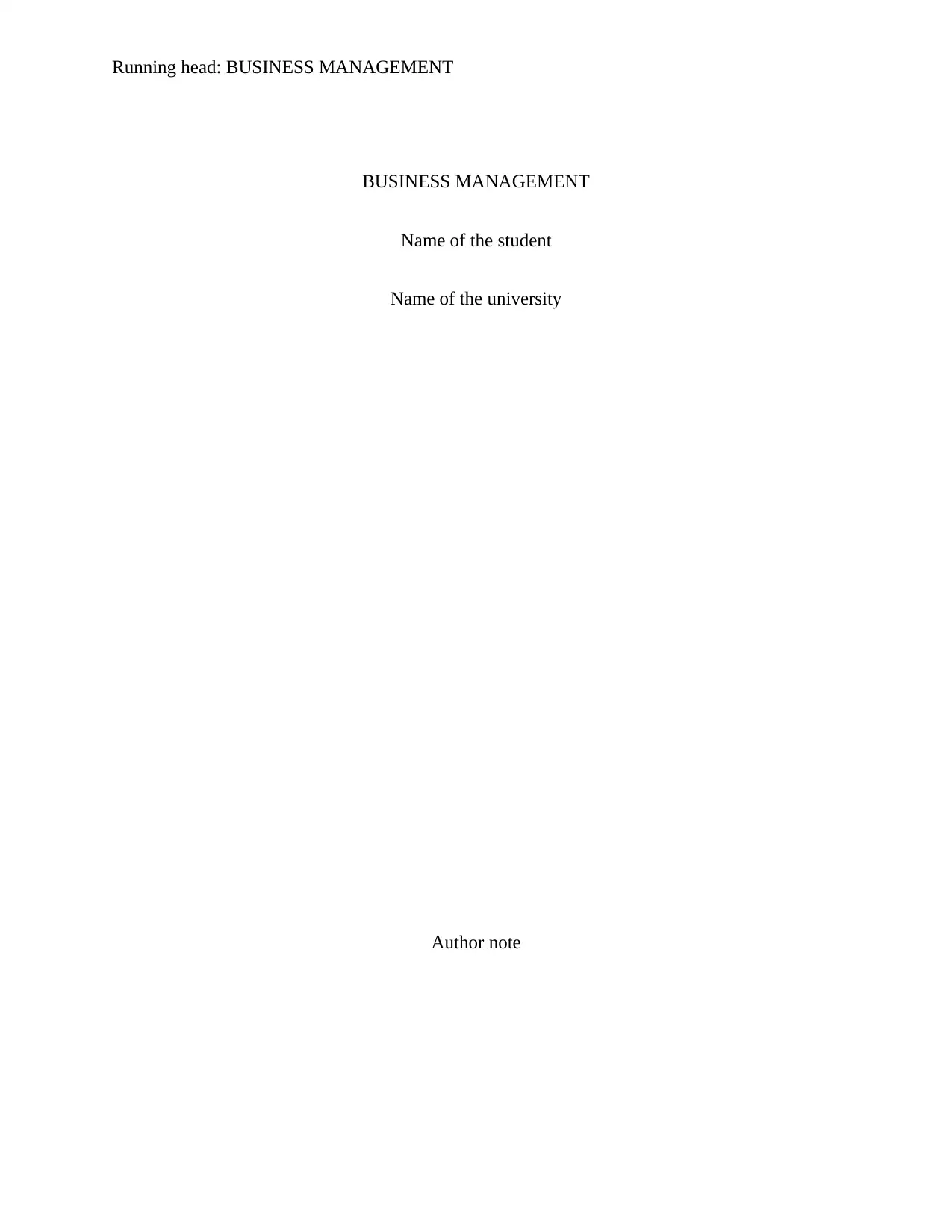
Running head: BUSINESS MANAGEMENT
BUSINESS MANAGEMENT
Name of the student
Name of the university
Author note
BUSINESS MANAGEMENT
Name of the student
Name of the university
Author note
Secure Best Marks with AI Grader
Need help grading? Try our AI Grader for instant feedback on your assignments.
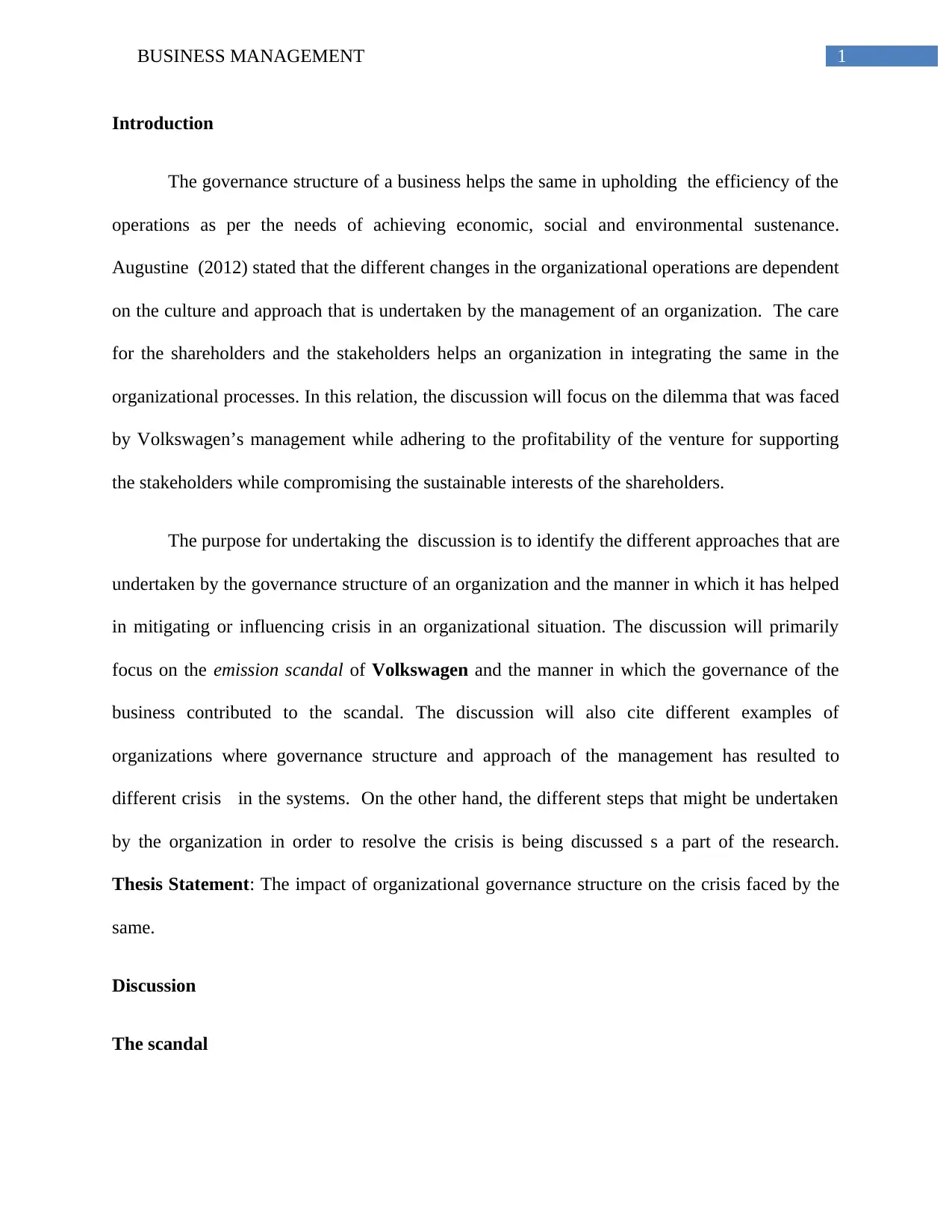
1BUSINESS MANAGEMENT
Introduction
The governance structure of a business helps the same in upholding the efficiency of the
operations as per the needs of achieving economic, social and environmental sustenance.
Augustine (2012) stated that the different changes in the organizational operations are dependent
on the culture and approach that is undertaken by the management of an organization. The care
for the shareholders and the stakeholders helps an organization in integrating the same in the
organizational processes. In this relation, the discussion will focus on the dilemma that was faced
by Volkswagen’s management while adhering to the profitability of the venture for supporting
the stakeholders while compromising the sustainable interests of the shareholders.
The purpose for undertaking the discussion is to identify the different approaches that are
undertaken by the governance structure of an organization and the manner in which it has helped
in mitigating or influencing crisis in an organizational situation. The discussion will primarily
focus on the emission scandal of Volkswagen and the manner in which the governance of the
business contributed to the scandal. The discussion will also cite different examples of
organizations where governance structure and approach of the management has resulted to
different crisis in the systems. On the other hand, the different steps that might be undertaken
by the organization in order to resolve the crisis is being discussed s a part of the research.
Thesis Statement: The impact of organizational governance structure on the crisis faced by the
same.
Discussion
The scandal
Introduction
The governance structure of a business helps the same in upholding the efficiency of the
operations as per the needs of achieving economic, social and environmental sustenance.
Augustine (2012) stated that the different changes in the organizational operations are dependent
on the culture and approach that is undertaken by the management of an organization. The care
for the shareholders and the stakeholders helps an organization in integrating the same in the
organizational processes. In this relation, the discussion will focus on the dilemma that was faced
by Volkswagen’s management while adhering to the profitability of the venture for supporting
the stakeholders while compromising the sustainable interests of the shareholders.
The purpose for undertaking the discussion is to identify the different approaches that are
undertaken by the governance structure of an organization and the manner in which it has helped
in mitigating or influencing crisis in an organizational situation. The discussion will primarily
focus on the emission scandal of Volkswagen and the manner in which the governance of the
business contributed to the scandal. The discussion will also cite different examples of
organizations where governance structure and approach of the management has resulted to
different crisis in the systems. On the other hand, the different steps that might be undertaken
by the organization in order to resolve the crisis is being discussed s a part of the research.
Thesis Statement: The impact of organizational governance structure on the crisis faced by the
same.
Discussion
The scandal
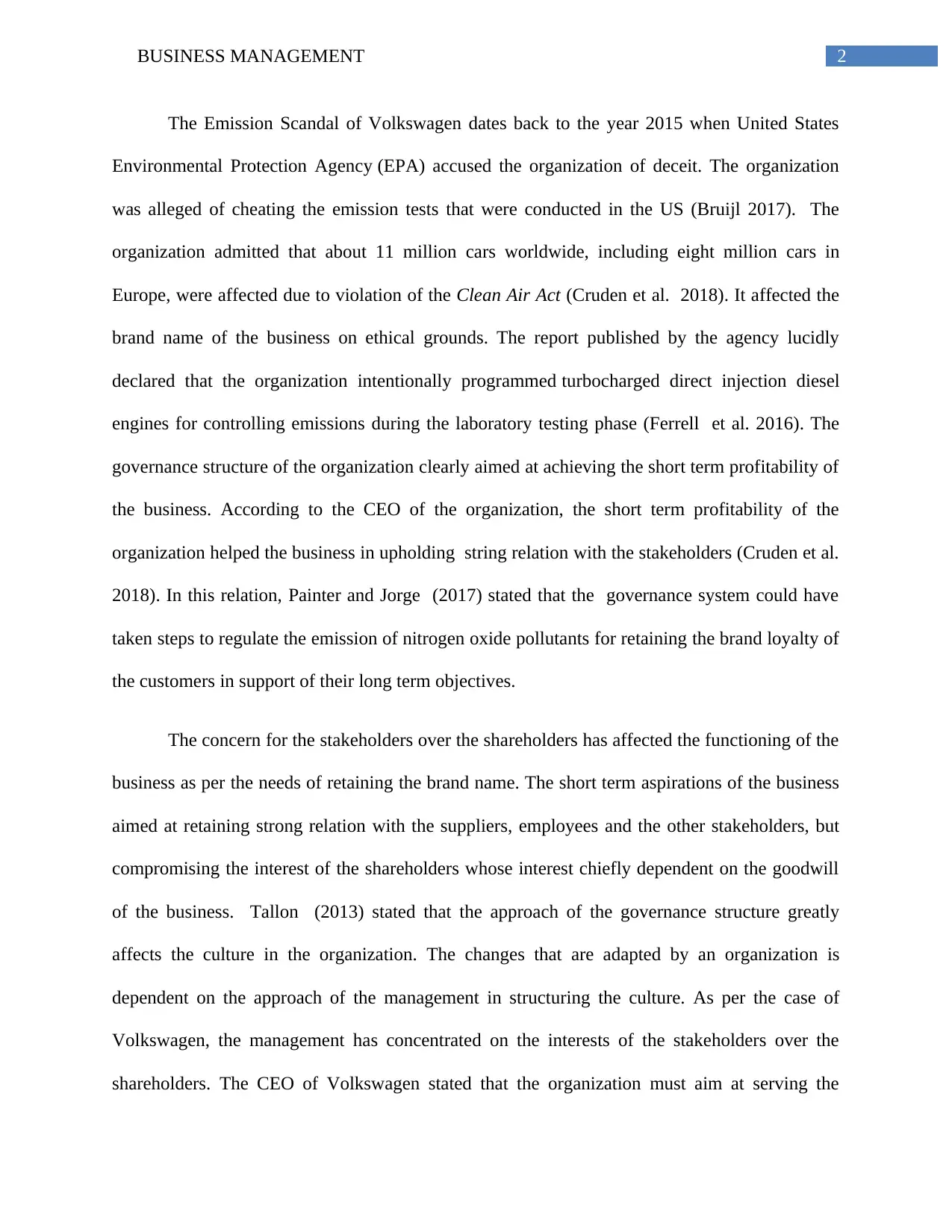
2BUSINESS MANAGEMENT
The Emission Scandal of Volkswagen dates back to the year 2015 when United States
Environmental Protection Agency (EPA) accused the organization of deceit. The organization
was alleged of cheating the emission tests that were conducted in the US (Bruijl 2017). The
organization admitted that about 11 million cars worldwide, including eight million cars in
Europe, were affected due to violation of the Clean Air Act (Cruden et al. 2018). It affected the
brand name of the business on ethical grounds. The report published by the agency lucidly
declared that the organization intentionally programmed turbocharged direct injection diesel
engines for controlling emissions during the laboratory testing phase (Ferrell et al. 2016). The
governance structure of the organization clearly aimed at achieving the short term profitability of
the business. According to the CEO of the organization, the short term profitability of the
organization helped the business in upholding string relation with the stakeholders (Cruden et al.
2018). In this relation, Painter and Jorge (2017) stated that the governance system could have
taken steps to regulate the emission of nitrogen oxide pollutants for retaining the brand loyalty of
the customers in support of their long term objectives.
The concern for the stakeholders over the shareholders has affected the functioning of the
business as per the needs of retaining the brand name. The short term aspirations of the business
aimed at retaining strong relation with the suppliers, employees and the other stakeholders, but
compromising the interest of the shareholders whose interest chiefly dependent on the goodwill
of the business. Tallon (2013) stated that the approach of the governance structure greatly
affects the culture in the organization. The changes that are adapted by an organization is
dependent on the approach of the management in structuring the culture. As per the case of
Volkswagen, the management has concentrated on the interests of the stakeholders over the
shareholders. The CEO of Volkswagen stated that the organization must aim at serving the
The Emission Scandal of Volkswagen dates back to the year 2015 when United States
Environmental Protection Agency (EPA) accused the organization of deceit. The organization
was alleged of cheating the emission tests that were conducted in the US (Bruijl 2017). The
organization admitted that about 11 million cars worldwide, including eight million cars in
Europe, were affected due to violation of the Clean Air Act (Cruden et al. 2018). It affected the
brand name of the business on ethical grounds. The report published by the agency lucidly
declared that the organization intentionally programmed turbocharged direct injection diesel
engines for controlling emissions during the laboratory testing phase (Ferrell et al. 2016). The
governance structure of the organization clearly aimed at achieving the short term profitability of
the business. According to the CEO of the organization, the short term profitability of the
organization helped the business in upholding string relation with the stakeholders (Cruden et al.
2018). In this relation, Painter and Jorge (2017) stated that the governance system could have
taken steps to regulate the emission of nitrogen oxide pollutants for retaining the brand loyalty of
the customers in support of their long term objectives.
The concern for the stakeholders over the shareholders has affected the functioning of the
business as per the needs of retaining the brand name. The short term aspirations of the business
aimed at retaining strong relation with the suppliers, employees and the other stakeholders, but
compromising the interest of the shareholders whose interest chiefly dependent on the goodwill
of the business. Tallon (2013) stated that the approach of the governance structure greatly
affects the culture in the organization. The changes that are adapted by an organization is
dependent on the approach of the management in structuring the culture. As per the case of
Volkswagen, the management has concentrated on the interests of the stakeholders over the
shareholders. The CEO of Volkswagen stated that the organization must aim at serving the
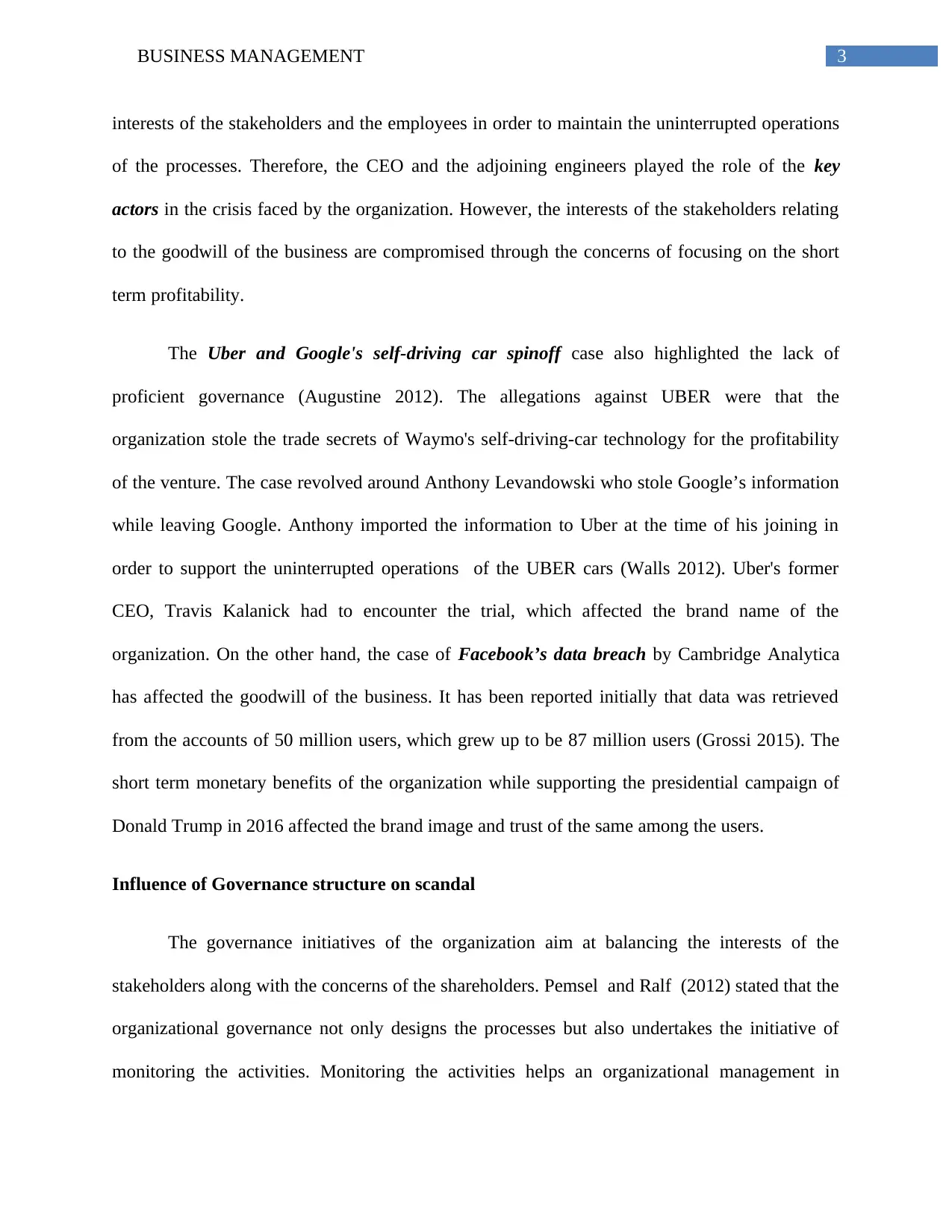
3BUSINESS MANAGEMENT
interests of the stakeholders and the employees in order to maintain the uninterrupted operations
of the processes. Therefore, the CEO and the adjoining engineers played the role of the key
actors in the crisis faced by the organization. However, the interests of the stakeholders relating
to the goodwill of the business are compromised through the concerns of focusing on the short
term profitability.
The Uber and Google's self-driving car spinoff case also highlighted the lack of
proficient governance (Augustine 2012). The allegations against UBER were that the
organization stole the trade secrets of Waymo's self-driving-car technology for the profitability
of the venture. The case revolved around Anthony Levandowski who stole Google’s information
while leaving Google. Anthony imported the information to Uber at the time of his joining in
order to support the uninterrupted operations of the UBER cars (Walls 2012). Uber's former
CEO, Travis Kalanick had to encounter the trial, which affected the brand name of the
organization. On the other hand, the case of Facebook’s data breach by Cambridge Analytica
has affected the goodwill of the business. It has been reported initially that data was retrieved
from the accounts of 50 million users, which grew up to be 87 million users (Grossi 2015). The
short term monetary benefits of the organization while supporting the presidential campaign of
Donald Trump in 2016 affected the brand image and trust of the same among the users.
Influence of Governance structure on scandal
The governance initiatives of the organization aim at balancing the interests of the
stakeholders along with the concerns of the shareholders. Pemsel and Ralf (2012) stated that the
organizational governance not only designs the processes but also undertakes the initiative of
monitoring the activities. Monitoring the activities helps an organizational management in
interests of the stakeholders and the employees in order to maintain the uninterrupted operations
of the processes. Therefore, the CEO and the adjoining engineers played the role of the key
actors in the crisis faced by the organization. However, the interests of the stakeholders relating
to the goodwill of the business are compromised through the concerns of focusing on the short
term profitability.
The Uber and Google's self-driving car spinoff case also highlighted the lack of
proficient governance (Augustine 2012). The allegations against UBER were that the
organization stole the trade secrets of Waymo's self-driving-car technology for the profitability
of the venture. The case revolved around Anthony Levandowski who stole Google’s information
while leaving Google. Anthony imported the information to Uber at the time of his joining in
order to support the uninterrupted operations of the UBER cars (Walls 2012). Uber's former
CEO, Travis Kalanick had to encounter the trial, which affected the brand name of the
organization. On the other hand, the case of Facebook’s data breach by Cambridge Analytica
has affected the goodwill of the business. It has been reported initially that data was retrieved
from the accounts of 50 million users, which grew up to be 87 million users (Grossi 2015). The
short term monetary benefits of the organization while supporting the presidential campaign of
Donald Trump in 2016 affected the brand image and trust of the same among the users.
Influence of Governance structure on scandal
The governance initiatives of the organization aim at balancing the interests of the
stakeholders along with the concerns of the shareholders. Pemsel and Ralf (2012) stated that the
organizational governance not only designs the processes but also undertakes the initiative of
monitoring the activities. Monitoring the activities helps an organizational management in
Secure Best Marks with AI Grader
Need help grading? Try our AI Grader for instant feedback on your assignments.
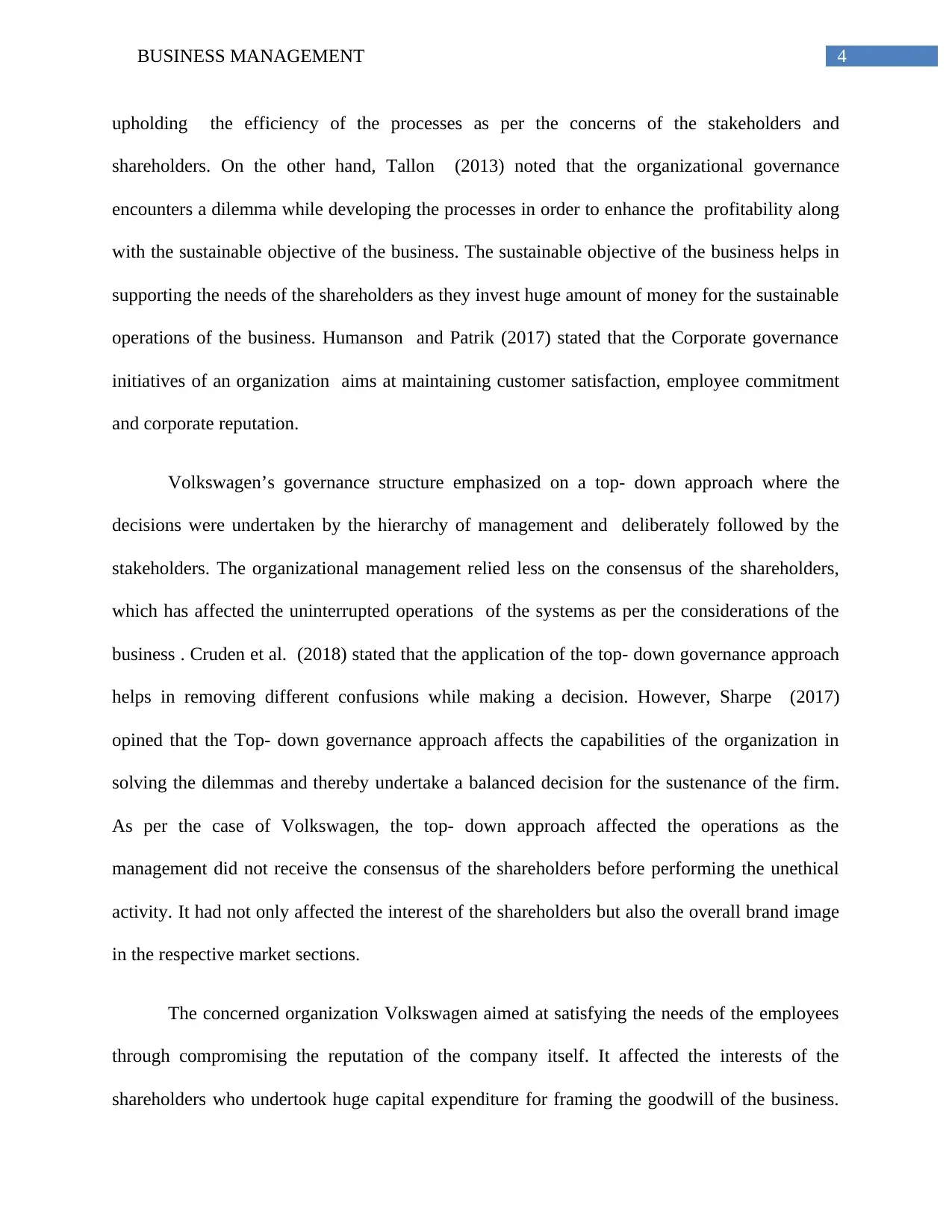
4BUSINESS MANAGEMENT
upholding the efficiency of the processes as per the concerns of the stakeholders and
shareholders. On the other hand, Tallon (2013) noted that the organizational governance
encounters a dilemma while developing the processes in order to enhance the profitability along
with the sustainable objective of the business. The sustainable objective of the business helps in
supporting the needs of the shareholders as they invest huge amount of money for the sustainable
operations of the business. Humanson and Patrik (2017) stated that the Corporate governance
initiatives of an organization aims at maintaining customer satisfaction, employee commitment
and corporate reputation.
Volkswagen’s governance structure emphasized on a top- down approach where the
decisions were undertaken by the hierarchy of management and deliberately followed by the
stakeholders. The organizational management relied less on the consensus of the shareholders,
which has affected the uninterrupted operations of the systems as per the considerations of the
business . Cruden et al. (2018) stated that the application of the top- down governance approach
helps in removing different confusions while making a decision. However, Sharpe (2017)
opined that the Top- down governance approach affects the capabilities of the organization in
solving the dilemmas and thereby undertake a balanced decision for the sustenance of the firm.
As per the case of Volkswagen, the top- down approach affected the operations as the
management did not receive the consensus of the shareholders before performing the unethical
activity. It had not only affected the interest of the shareholders but also the overall brand image
in the respective market sections.
The concerned organization Volkswagen aimed at satisfying the needs of the employees
through compromising the reputation of the company itself. It affected the interests of the
shareholders who undertook huge capital expenditure for framing the goodwill of the business.
upholding the efficiency of the processes as per the concerns of the stakeholders and
shareholders. On the other hand, Tallon (2013) noted that the organizational governance
encounters a dilemma while developing the processes in order to enhance the profitability along
with the sustainable objective of the business. The sustainable objective of the business helps in
supporting the needs of the shareholders as they invest huge amount of money for the sustainable
operations of the business. Humanson and Patrik (2017) stated that the Corporate governance
initiatives of an organization aims at maintaining customer satisfaction, employee commitment
and corporate reputation.
Volkswagen’s governance structure emphasized on a top- down approach where the
decisions were undertaken by the hierarchy of management and deliberately followed by the
stakeholders. The organizational management relied less on the consensus of the shareholders,
which has affected the uninterrupted operations of the systems as per the considerations of the
business . Cruden et al. (2018) stated that the application of the top- down governance approach
helps in removing different confusions while making a decision. However, Sharpe (2017)
opined that the Top- down governance approach affects the capabilities of the organization in
solving the dilemmas and thereby undertake a balanced decision for the sustenance of the firm.
As per the case of Volkswagen, the top- down approach affected the operations as the
management did not receive the consensus of the shareholders before performing the unethical
activity. It had not only affected the interest of the shareholders but also the overall brand image
in the respective market sections.
The concerned organization Volkswagen aimed at satisfying the needs of the employees
through compromising the reputation of the company itself. It affected the interests of the
shareholders who undertook huge capital expenditure for framing the goodwill of the business.
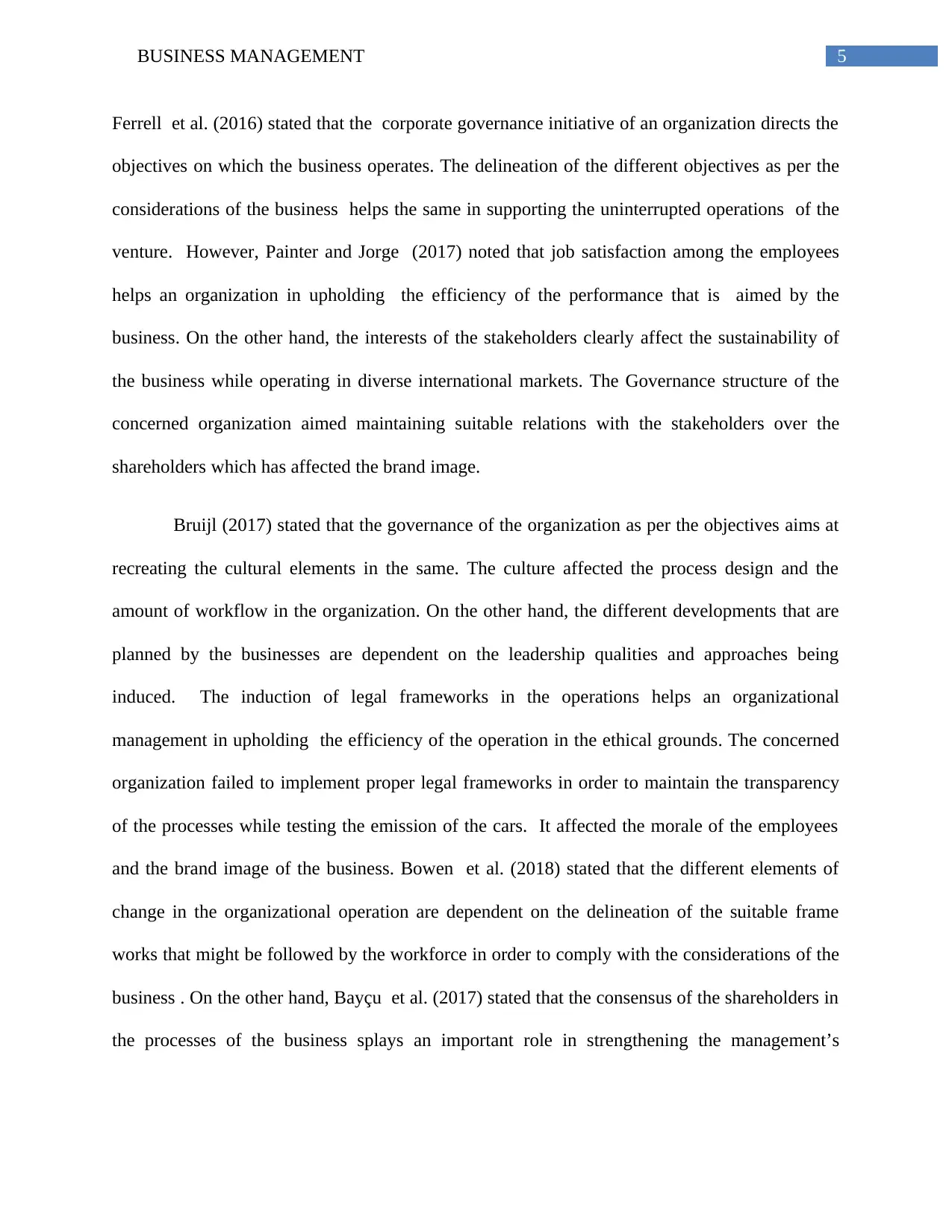
5BUSINESS MANAGEMENT
Ferrell et al. (2016) stated that the corporate governance initiative of an organization directs the
objectives on which the business operates. The delineation of the different objectives as per the
considerations of the business helps the same in supporting the uninterrupted operations of the
venture. However, Painter and Jorge (2017) noted that job satisfaction among the employees
helps an organization in upholding the efficiency of the performance that is aimed by the
business. On the other hand, the interests of the stakeholders clearly affect the sustainability of
the business while operating in diverse international markets. The Governance structure of the
concerned organization aimed maintaining suitable relations with the stakeholders over the
shareholders which has affected the brand image.
Bruijl (2017) stated that the governance of the organization as per the objectives aims at
recreating the cultural elements in the same. The culture affected the process design and the
amount of workflow in the organization. On the other hand, the different developments that are
planned by the businesses are dependent on the leadership qualities and approaches being
induced. The induction of legal frameworks in the operations helps an organizational
management in upholding the efficiency of the operation in the ethical grounds. The concerned
organization failed to implement proper legal frameworks in order to maintain the transparency
of the processes while testing the emission of the cars. It affected the morale of the employees
and the brand image of the business. Bowen et al. (2018) stated that the different elements of
change in the organizational operation are dependent on the delineation of the suitable frame
works that might be followed by the workforce in order to comply with the considerations of the
business . On the other hand, Bayçu et al. (2017) stated that the consensus of the shareholders in
the processes of the business splays an important role in strengthening the management’s
Ferrell et al. (2016) stated that the corporate governance initiative of an organization directs the
objectives on which the business operates. The delineation of the different objectives as per the
considerations of the business helps the same in supporting the uninterrupted operations of the
venture. However, Painter and Jorge (2017) noted that job satisfaction among the employees
helps an organization in upholding the efficiency of the performance that is aimed by the
business. On the other hand, the interests of the stakeholders clearly affect the sustainability of
the business while operating in diverse international markets. The Governance structure of the
concerned organization aimed maintaining suitable relations with the stakeholders over the
shareholders which has affected the brand image.
Bruijl (2017) stated that the governance of the organization as per the objectives aims at
recreating the cultural elements in the same. The culture affected the process design and the
amount of workflow in the organization. On the other hand, the different developments that are
planned by the businesses are dependent on the leadership qualities and approaches being
induced. The induction of legal frameworks in the operations helps an organizational
management in upholding the efficiency of the operation in the ethical grounds. The concerned
organization failed to implement proper legal frameworks in order to maintain the transparency
of the processes while testing the emission of the cars. It affected the morale of the employees
and the brand image of the business. Bowen et al. (2018) stated that the different elements of
change in the organizational operation are dependent on the delineation of the suitable frame
works that might be followed by the workforce in order to comply with the considerations of the
business . On the other hand, Bayçu et al. (2017) stated that the consensus of the shareholders in
the processes of the business splays an important role in strengthening the management’s
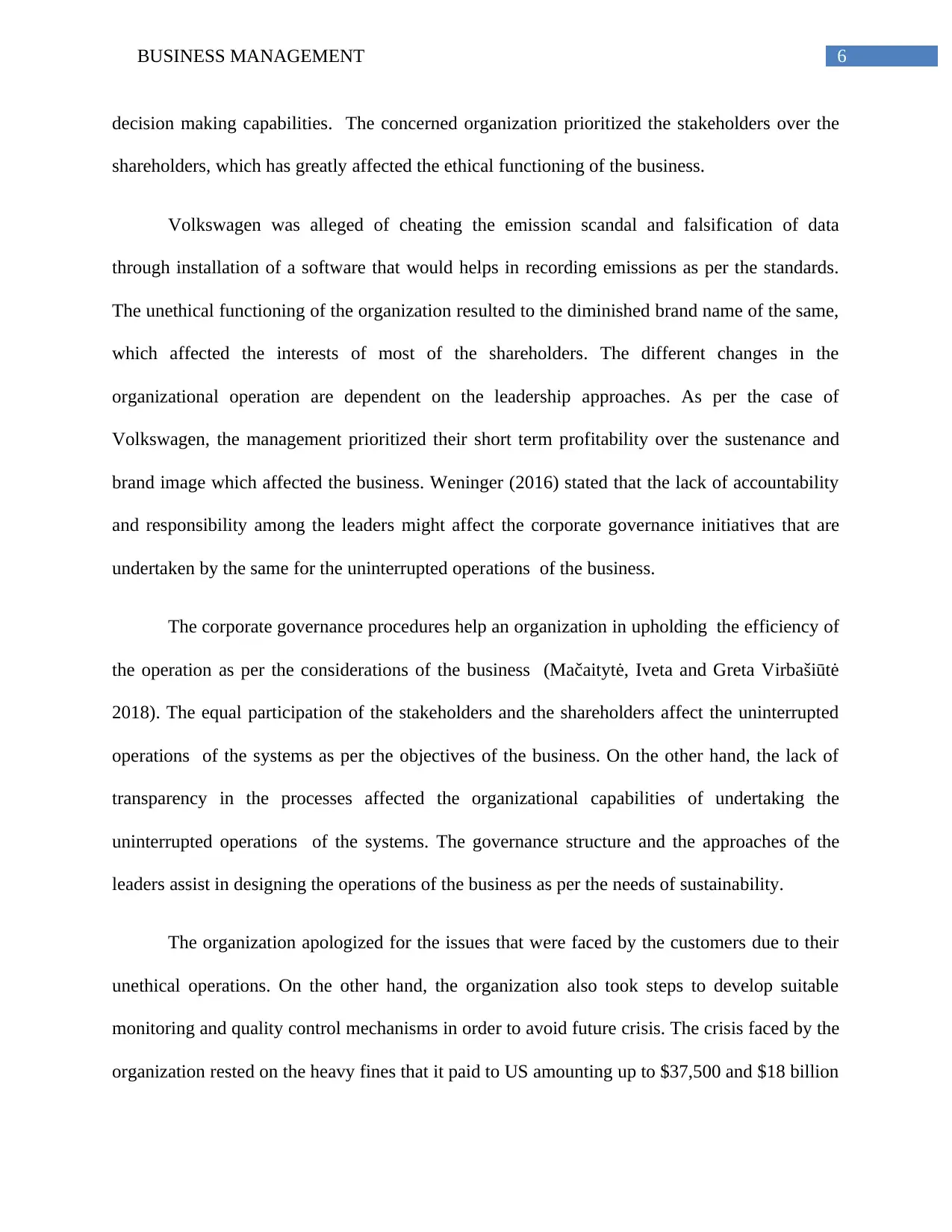
6BUSINESS MANAGEMENT
decision making capabilities. The concerned organization prioritized the stakeholders over the
shareholders, which has greatly affected the ethical functioning of the business.
Volkswagen was alleged of cheating the emission scandal and falsification of data
through installation of a software that would helps in recording emissions as per the standards.
The unethical functioning of the organization resulted to the diminished brand name of the same,
which affected the interests of most of the shareholders. The different changes in the
organizational operation are dependent on the leadership approaches. As per the case of
Volkswagen, the management prioritized their short term profitability over the sustenance and
brand image which affected the business. Weninger (2016) stated that the lack of accountability
and responsibility among the leaders might affect the corporate governance initiatives that are
undertaken by the same for the uninterrupted operations of the business.
The corporate governance procedures help an organization in upholding the efficiency of
the operation as per the considerations of the business (Mačaitytė, Iveta and Greta Virbašiūtė
2018). The equal participation of the stakeholders and the shareholders affect the uninterrupted
operations of the systems as per the objectives of the business. On the other hand, the lack of
transparency in the processes affected the organizational capabilities of undertaking the
uninterrupted operations of the systems. The governance structure and the approaches of the
leaders assist in designing the operations of the business as per the needs of sustainability.
The organization apologized for the issues that were faced by the customers due to their
unethical operations. On the other hand, the organization also took steps to develop suitable
monitoring and quality control mechanisms in order to avoid future crisis. The crisis faced by the
organization rested on the heavy fines that it paid to US amounting up to $37,500 and $18 billion
decision making capabilities. The concerned organization prioritized the stakeholders over the
shareholders, which has greatly affected the ethical functioning of the business.
Volkswagen was alleged of cheating the emission scandal and falsification of data
through installation of a software that would helps in recording emissions as per the standards.
The unethical functioning of the organization resulted to the diminished brand name of the same,
which affected the interests of most of the shareholders. The different changes in the
organizational operation are dependent on the leadership approaches. As per the case of
Volkswagen, the management prioritized their short term profitability over the sustenance and
brand image which affected the business. Weninger (2016) stated that the lack of accountability
and responsibility among the leaders might affect the corporate governance initiatives that are
undertaken by the same for the uninterrupted operations of the business.
The corporate governance procedures help an organization in upholding the efficiency of
the operation as per the considerations of the business (Mačaitytė, Iveta and Greta Virbašiūtė
2018). The equal participation of the stakeholders and the shareholders affect the uninterrupted
operations of the systems as per the objectives of the business. On the other hand, the lack of
transparency in the processes affected the organizational capabilities of undertaking the
uninterrupted operations of the systems. The governance structure and the approaches of the
leaders assist in designing the operations of the business as per the needs of sustainability.
The organization apologized for the issues that were faced by the customers due to their
unethical operations. On the other hand, the organization also took steps to develop suitable
monitoring and quality control mechanisms in order to avoid future crisis. The crisis faced by the
organization rested on the heavy fines that it paid to US amounting up to $37,500 and $18 billion
Paraphrase This Document
Need a fresh take? Get an instant paraphrase of this document with our AI Paraphraser
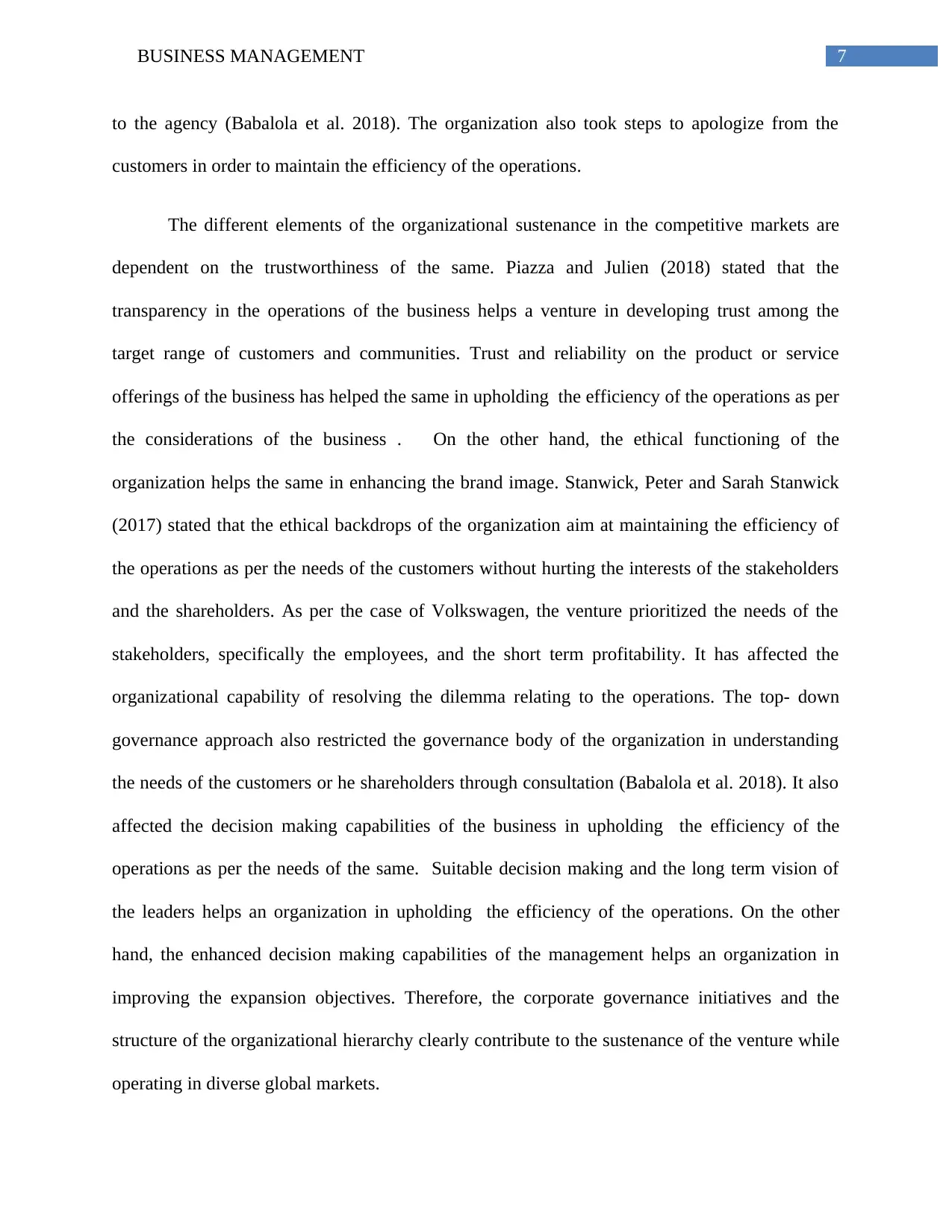
7BUSINESS MANAGEMENT
to the agency (Babalola et al. 2018). The organization also took steps to apologize from the
customers in order to maintain the efficiency of the operations.
The different elements of the organizational sustenance in the competitive markets are
dependent on the trustworthiness of the same. Piazza and Julien (2018) stated that the
transparency in the operations of the business helps a venture in developing trust among the
target range of customers and communities. Trust and reliability on the product or service
offerings of the business has helped the same in upholding the efficiency of the operations as per
the considerations of the business . On the other hand, the ethical functioning of the
organization helps the same in enhancing the brand image. Stanwick, Peter and Sarah Stanwick
(2017) stated that the ethical backdrops of the organization aim at maintaining the efficiency of
the operations as per the needs of the customers without hurting the interests of the stakeholders
and the shareholders. As per the case of Volkswagen, the venture prioritized the needs of the
stakeholders, specifically the employees, and the short term profitability. It has affected the
organizational capability of resolving the dilemma relating to the operations. The top- down
governance approach also restricted the governance body of the organization in understanding
the needs of the customers or he shareholders through consultation (Babalola et al. 2018). It also
affected the decision making capabilities of the business in upholding the efficiency of the
operations as per the needs of the same. Suitable decision making and the long term vision of
the leaders helps an organization in upholding the efficiency of the operations. On the other
hand, the enhanced decision making capabilities of the management helps an organization in
improving the expansion objectives. Therefore, the corporate governance initiatives and the
structure of the organizational hierarchy clearly contribute to the sustenance of the venture while
operating in diverse global markets.
to the agency (Babalola et al. 2018). The organization also took steps to apologize from the
customers in order to maintain the efficiency of the operations.
The different elements of the organizational sustenance in the competitive markets are
dependent on the trustworthiness of the same. Piazza and Julien (2018) stated that the
transparency in the operations of the business helps a venture in developing trust among the
target range of customers and communities. Trust and reliability on the product or service
offerings of the business has helped the same in upholding the efficiency of the operations as per
the considerations of the business . On the other hand, the ethical functioning of the
organization helps the same in enhancing the brand image. Stanwick, Peter and Sarah Stanwick
(2017) stated that the ethical backdrops of the organization aim at maintaining the efficiency of
the operations as per the needs of the customers without hurting the interests of the stakeholders
and the shareholders. As per the case of Volkswagen, the venture prioritized the needs of the
stakeholders, specifically the employees, and the short term profitability. It has affected the
organizational capability of resolving the dilemma relating to the operations. The top- down
governance approach also restricted the governance body of the organization in understanding
the needs of the customers or he shareholders through consultation (Babalola et al. 2018). It also
affected the decision making capabilities of the business in upholding the efficiency of the
operations as per the needs of the same. Suitable decision making and the long term vision of
the leaders helps an organization in upholding the efficiency of the operations. On the other
hand, the enhanced decision making capabilities of the management helps an organization in
improving the expansion objectives. Therefore, the corporate governance initiatives and the
structure of the organizational hierarchy clearly contribute to the sustenance of the venture while
operating in diverse global markets.
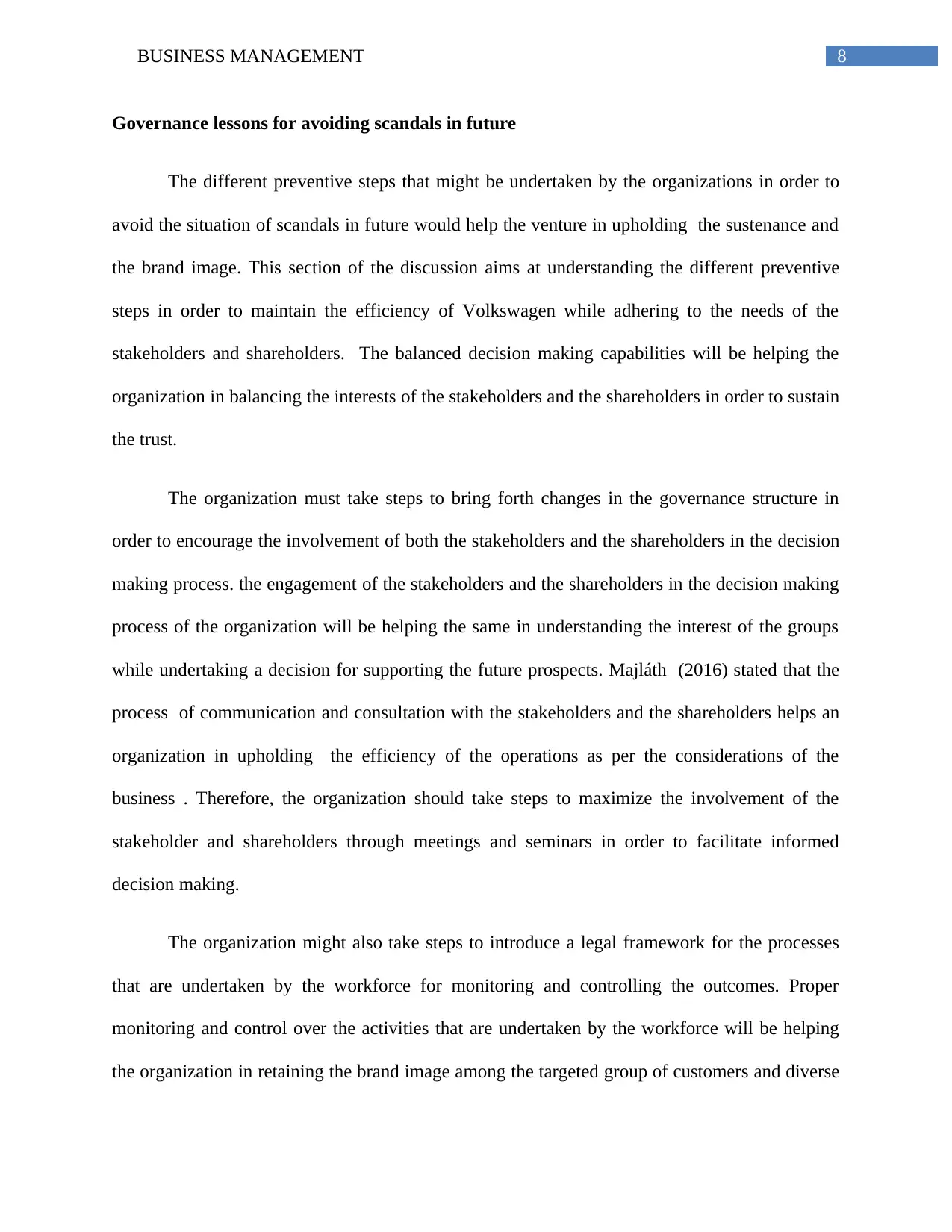
8BUSINESS MANAGEMENT
Governance lessons for avoiding scandals in future
The different preventive steps that might be undertaken by the organizations in order to
avoid the situation of scandals in future would help the venture in upholding the sustenance and
the brand image. This section of the discussion aims at understanding the different preventive
steps in order to maintain the efficiency of Volkswagen while adhering to the needs of the
stakeholders and shareholders. The balanced decision making capabilities will be helping the
organization in balancing the interests of the stakeholders and the shareholders in order to sustain
the trust.
The organization must take steps to bring forth changes in the governance structure in
order to encourage the involvement of both the stakeholders and the shareholders in the decision
making process. the engagement of the stakeholders and the shareholders in the decision making
process of the organization will be helping the same in understanding the interest of the groups
while undertaking a decision for supporting the future prospects. Majláth (2016) stated that the
process of communication and consultation with the stakeholders and the shareholders helps an
organization in upholding the efficiency of the operations as per the considerations of the
business . Therefore, the organization should take steps to maximize the involvement of the
stakeholder and shareholders through meetings and seminars in order to facilitate informed
decision making.
The organization might also take steps to introduce a legal framework for the processes
that are undertaken by the workforce for monitoring and controlling the outcomes. Proper
monitoring and control over the activities that are undertaken by the workforce will be helping
the organization in retaining the brand image among the targeted group of customers and diverse
Governance lessons for avoiding scandals in future
The different preventive steps that might be undertaken by the organizations in order to
avoid the situation of scandals in future would help the venture in upholding the sustenance and
the brand image. This section of the discussion aims at understanding the different preventive
steps in order to maintain the efficiency of Volkswagen while adhering to the needs of the
stakeholders and shareholders. The balanced decision making capabilities will be helping the
organization in balancing the interests of the stakeholders and the shareholders in order to sustain
the trust.
The organization must take steps to bring forth changes in the governance structure in
order to encourage the involvement of both the stakeholders and the shareholders in the decision
making process. the engagement of the stakeholders and the shareholders in the decision making
process of the organization will be helping the same in understanding the interest of the groups
while undertaking a decision for supporting the future prospects. Majláth (2016) stated that the
process of communication and consultation with the stakeholders and the shareholders helps an
organization in upholding the efficiency of the operations as per the considerations of the
business . Therefore, the organization should take steps to maximize the involvement of the
stakeholder and shareholders through meetings and seminars in order to facilitate informed
decision making.
The organization might also take steps to introduce a legal framework for the processes
that are undertaken by the workforce for monitoring and controlling the outcomes. Proper
monitoring and control over the activities that are undertaken by the workforce will be helping
the organization in retaining the brand image among the targeted group of customers and diverse
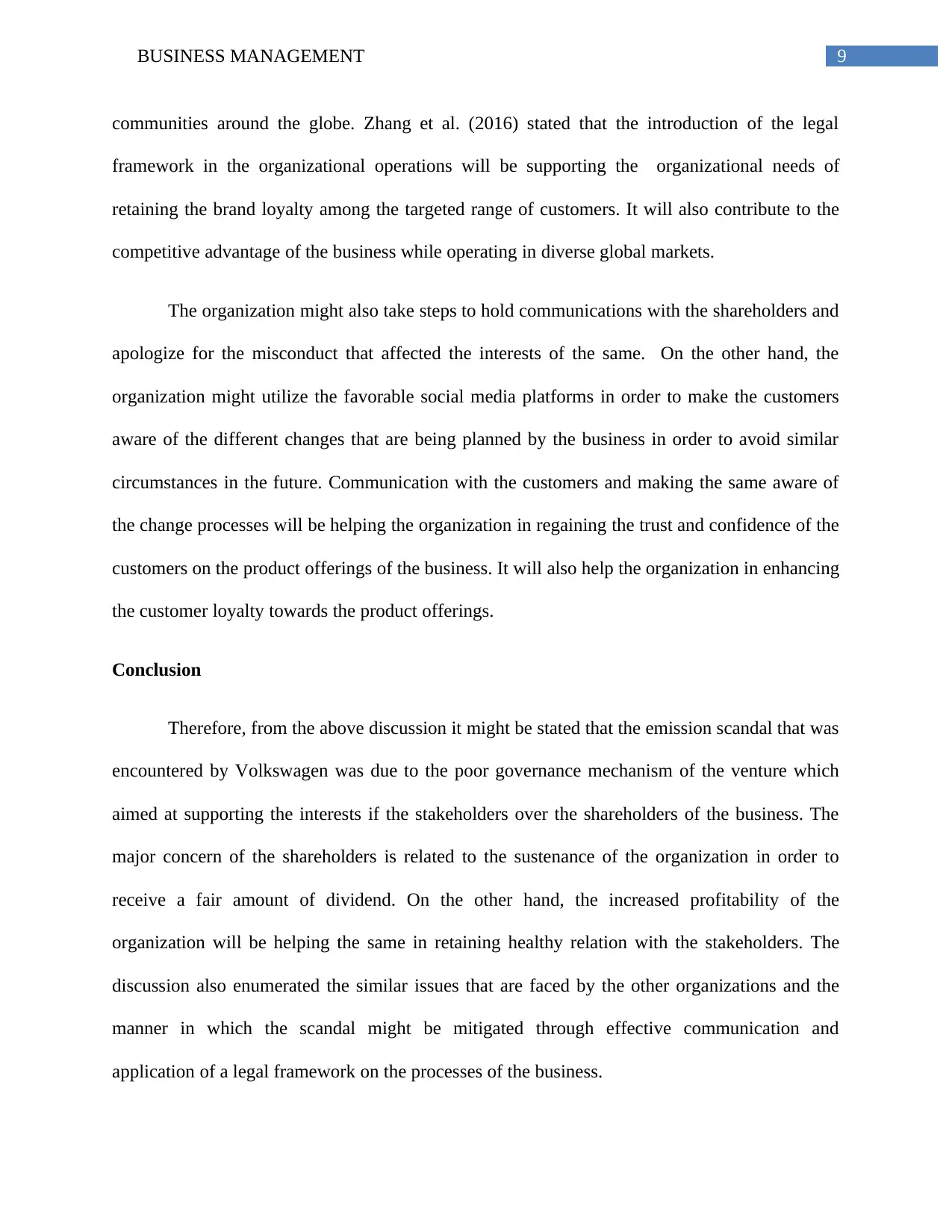
9BUSINESS MANAGEMENT
communities around the globe. Zhang et al. (2016) stated that the introduction of the legal
framework in the organizational operations will be supporting the organizational needs of
retaining the brand loyalty among the targeted range of customers. It will also contribute to the
competitive advantage of the business while operating in diverse global markets.
The organization might also take steps to hold communications with the shareholders and
apologize for the misconduct that affected the interests of the same. On the other hand, the
organization might utilize the favorable social media platforms in order to make the customers
aware of the different changes that are being planned by the business in order to avoid similar
circumstances in the future. Communication with the customers and making the same aware of
the change processes will be helping the organization in regaining the trust and confidence of the
customers on the product offerings of the business. It will also help the organization in enhancing
the customer loyalty towards the product offerings.
Conclusion
Therefore, from the above discussion it might be stated that the emission scandal that was
encountered by Volkswagen was due to the poor governance mechanism of the venture which
aimed at supporting the interests if the stakeholders over the shareholders of the business. The
major concern of the shareholders is related to the sustenance of the organization in order to
receive a fair amount of dividend. On the other hand, the increased profitability of the
organization will be helping the same in retaining healthy relation with the stakeholders. The
discussion also enumerated the similar issues that are faced by the other organizations and the
manner in which the scandal might be mitigated through effective communication and
application of a legal framework on the processes of the business.
communities around the globe. Zhang et al. (2016) stated that the introduction of the legal
framework in the organizational operations will be supporting the organizational needs of
retaining the brand loyalty among the targeted range of customers. It will also contribute to the
competitive advantage of the business while operating in diverse global markets.
The organization might also take steps to hold communications with the shareholders and
apologize for the misconduct that affected the interests of the same. On the other hand, the
organization might utilize the favorable social media platforms in order to make the customers
aware of the different changes that are being planned by the business in order to avoid similar
circumstances in the future. Communication with the customers and making the same aware of
the change processes will be helping the organization in regaining the trust and confidence of the
customers on the product offerings of the business. It will also help the organization in enhancing
the customer loyalty towards the product offerings.
Conclusion
Therefore, from the above discussion it might be stated that the emission scandal that was
encountered by Volkswagen was due to the poor governance mechanism of the venture which
aimed at supporting the interests if the stakeholders over the shareholders of the business. The
major concern of the shareholders is related to the sustenance of the organization in order to
receive a fair amount of dividend. On the other hand, the increased profitability of the
organization will be helping the same in retaining healthy relation with the stakeholders. The
discussion also enumerated the similar issues that are faced by the other organizations and the
manner in which the scandal might be mitigated through effective communication and
application of a legal framework on the processes of the business.
Secure Best Marks with AI Grader
Need help grading? Try our AI Grader for instant feedback on your assignments.
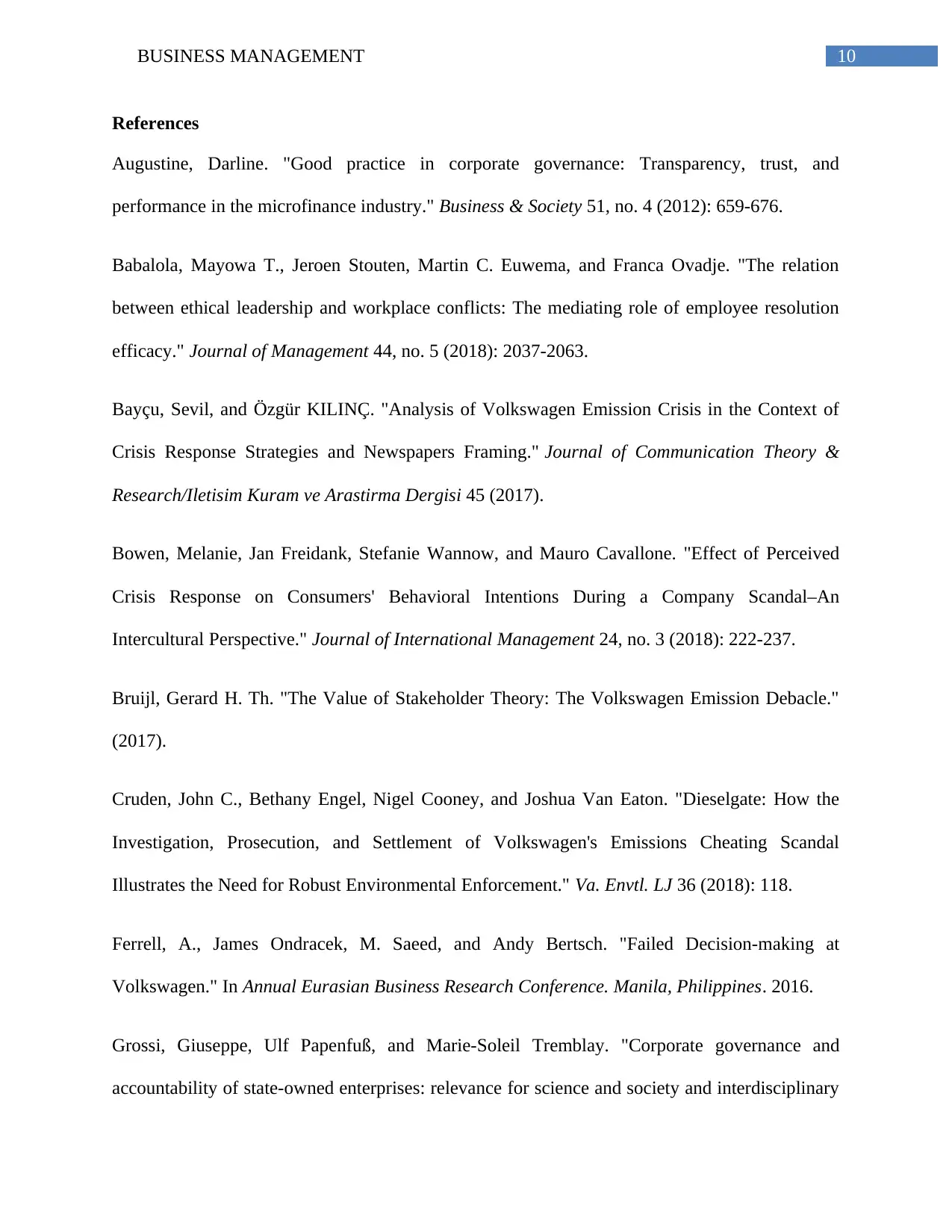
10BUSINESS MANAGEMENT
References
Augustine, Darline. "Good practice in corporate governance: Transparency, trust, and
performance in the microfinance industry." Business & Society 51, no. 4 (2012): 659-676.
Babalola, Mayowa T., Jeroen Stouten, Martin C. Euwema, and Franca Ovadje. "The relation
between ethical leadership and workplace conflicts: The mediating role of employee resolution
efficacy." Journal of Management 44, no. 5 (2018): 2037-2063.
Bayçu, Sevil, and Özgür KILINÇ. "Analysis of Volkswagen Emission Crisis in the Context of
Crisis Response Strategies and Newspapers Framing." Journal of Communication Theory &
Research/Iletisim Kuram ve Arastirma Dergisi 45 (2017).
Bowen, Melanie, Jan Freidank, Stefanie Wannow, and Mauro Cavallone. "Effect of Perceived
Crisis Response on Consumers' Behavioral Intentions During a Company Scandal–An
Intercultural Perspective." Journal of International Management 24, no. 3 (2018): 222-237.
Bruijl, Gerard H. Th. "The Value of Stakeholder Theory: The Volkswagen Emission Debacle."
(2017).
Cruden, John C., Bethany Engel, Nigel Cooney, and Joshua Van Eaton. "Dieselgate: How the
Investigation, Prosecution, and Settlement of Volkswagen's Emissions Cheating Scandal
Illustrates the Need for Robust Environmental Enforcement." Va. Envtl. LJ 36 (2018): 118.
Ferrell, A., James Ondracek, M. Saeed, and Andy Bertsch. "Failed Decision-making at
Volkswagen." In Annual Eurasian Business Research Conference. Manila, Philippines. 2016.
Grossi, Giuseppe, Ulf Papenfuß, and Marie-Soleil Tremblay. "Corporate governance and
accountability of state-owned enterprises: relevance for science and society and interdisciplinary
References
Augustine, Darline. "Good practice in corporate governance: Transparency, trust, and
performance in the microfinance industry." Business & Society 51, no. 4 (2012): 659-676.
Babalola, Mayowa T., Jeroen Stouten, Martin C. Euwema, and Franca Ovadje. "The relation
between ethical leadership and workplace conflicts: The mediating role of employee resolution
efficacy." Journal of Management 44, no. 5 (2018): 2037-2063.
Bayçu, Sevil, and Özgür KILINÇ. "Analysis of Volkswagen Emission Crisis in the Context of
Crisis Response Strategies and Newspapers Framing." Journal of Communication Theory &
Research/Iletisim Kuram ve Arastirma Dergisi 45 (2017).
Bowen, Melanie, Jan Freidank, Stefanie Wannow, and Mauro Cavallone. "Effect of Perceived
Crisis Response on Consumers' Behavioral Intentions During a Company Scandal–An
Intercultural Perspective." Journal of International Management 24, no. 3 (2018): 222-237.
Bruijl, Gerard H. Th. "The Value of Stakeholder Theory: The Volkswagen Emission Debacle."
(2017).
Cruden, John C., Bethany Engel, Nigel Cooney, and Joshua Van Eaton. "Dieselgate: How the
Investigation, Prosecution, and Settlement of Volkswagen's Emissions Cheating Scandal
Illustrates the Need for Robust Environmental Enforcement." Va. Envtl. LJ 36 (2018): 118.
Ferrell, A., James Ondracek, M. Saeed, and Andy Bertsch. "Failed Decision-making at
Volkswagen." In Annual Eurasian Business Research Conference. Manila, Philippines. 2016.
Grossi, Giuseppe, Ulf Papenfuß, and Marie-Soleil Tremblay. "Corporate governance and
accountability of state-owned enterprises: relevance for science and society and interdisciplinary
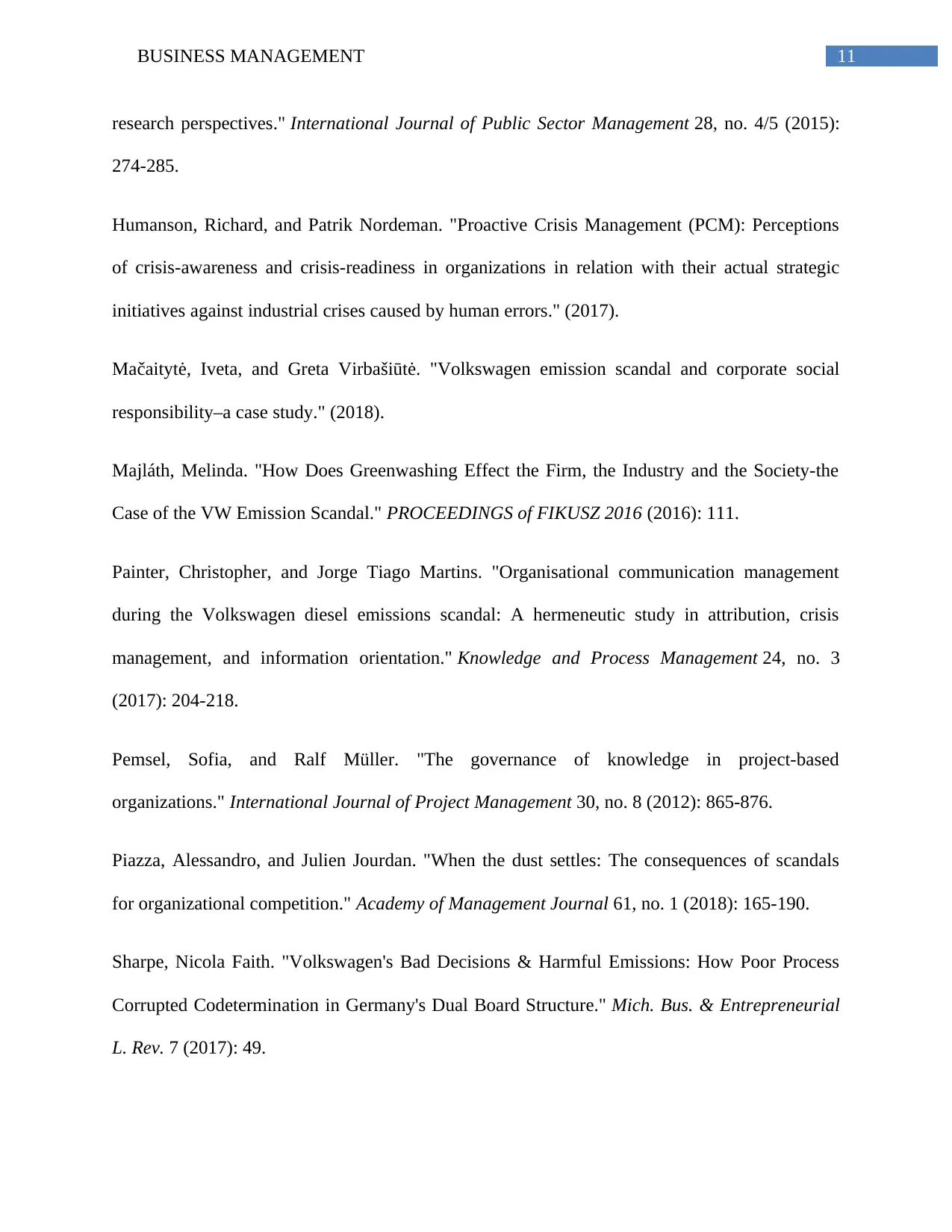
11BUSINESS MANAGEMENT
research perspectives." International Journal of Public Sector Management 28, no. 4/5 (2015):
274-285.
Humanson, Richard, and Patrik Nordeman. "Proactive Crisis Management (PCM): Perceptions
of crisis-awareness and crisis-readiness in organizations in relation with their actual strategic
initiatives against industrial crises caused by human errors." (2017).
Mačaitytė, Iveta, and Greta Virbašiūtė. "Volkswagen emission scandal and corporate social
responsibility–a case study." (2018).
Majláth, Melinda. "How Does Greenwashing Effect the Firm, the Industry and the Society-the
Case of the VW Emission Scandal." PROCEEDINGS of FIKUSZ 2016 (2016): 111.
Painter, Christopher, and Jorge Tiago Martins. "Organisational communication management
during the Volkswagen diesel emissions scandal: A hermeneutic study in attribution, crisis
management, and information orientation." Knowledge and Process Management 24, no. 3
(2017): 204-218.
Pemsel, Sofia, and Ralf Müller. "The governance of knowledge in project-based
organizations." International Journal of Project Management 30, no. 8 (2012): 865-876.
Piazza, Alessandro, and Julien Jourdan. "When the dust settles: The consequences of scandals
for organizational competition." Academy of Management Journal 61, no. 1 (2018): 165-190.
Sharpe, Nicola Faith. "Volkswagen's Bad Decisions & Harmful Emissions: How Poor Process
Corrupted Codetermination in Germany's Dual Board Structure." Mich. Bus. & Entrepreneurial
L. Rev. 7 (2017): 49.
research perspectives." International Journal of Public Sector Management 28, no. 4/5 (2015):
274-285.
Humanson, Richard, and Patrik Nordeman. "Proactive Crisis Management (PCM): Perceptions
of crisis-awareness and crisis-readiness in organizations in relation with their actual strategic
initiatives against industrial crises caused by human errors." (2017).
Mačaitytė, Iveta, and Greta Virbašiūtė. "Volkswagen emission scandal and corporate social
responsibility–a case study." (2018).
Majláth, Melinda. "How Does Greenwashing Effect the Firm, the Industry and the Society-the
Case of the VW Emission Scandal." PROCEEDINGS of FIKUSZ 2016 (2016): 111.
Painter, Christopher, and Jorge Tiago Martins. "Organisational communication management
during the Volkswagen diesel emissions scandal: A hermeneutic study in attribution, crisis
management, and information orientation." Knowledge and Process Management 24, no. 3
(2017): 204-218.
Pemsel, Sofia, and Ralf Müller. "The governance of knowledge in project-based
organizations." International Journal of Project Management 30, no. 8 (2012): 865-876.
Piazza, Alessandro, and Julien Jourdan. "When the dust settles: The consequences of scandals
for organizational competition." Academy of Management Journal 61, no. 1 (2018): 165-190.
Sharpe, Nicola Faith. "Volkswagen's Bad Decisions & Harmful Emissions: How Poor Process
Corrupted Codetermination in Germany's Dual Board Structure." Mich. Bus. & Entrepreneurial
L. Rev. 7 (2017): 49.
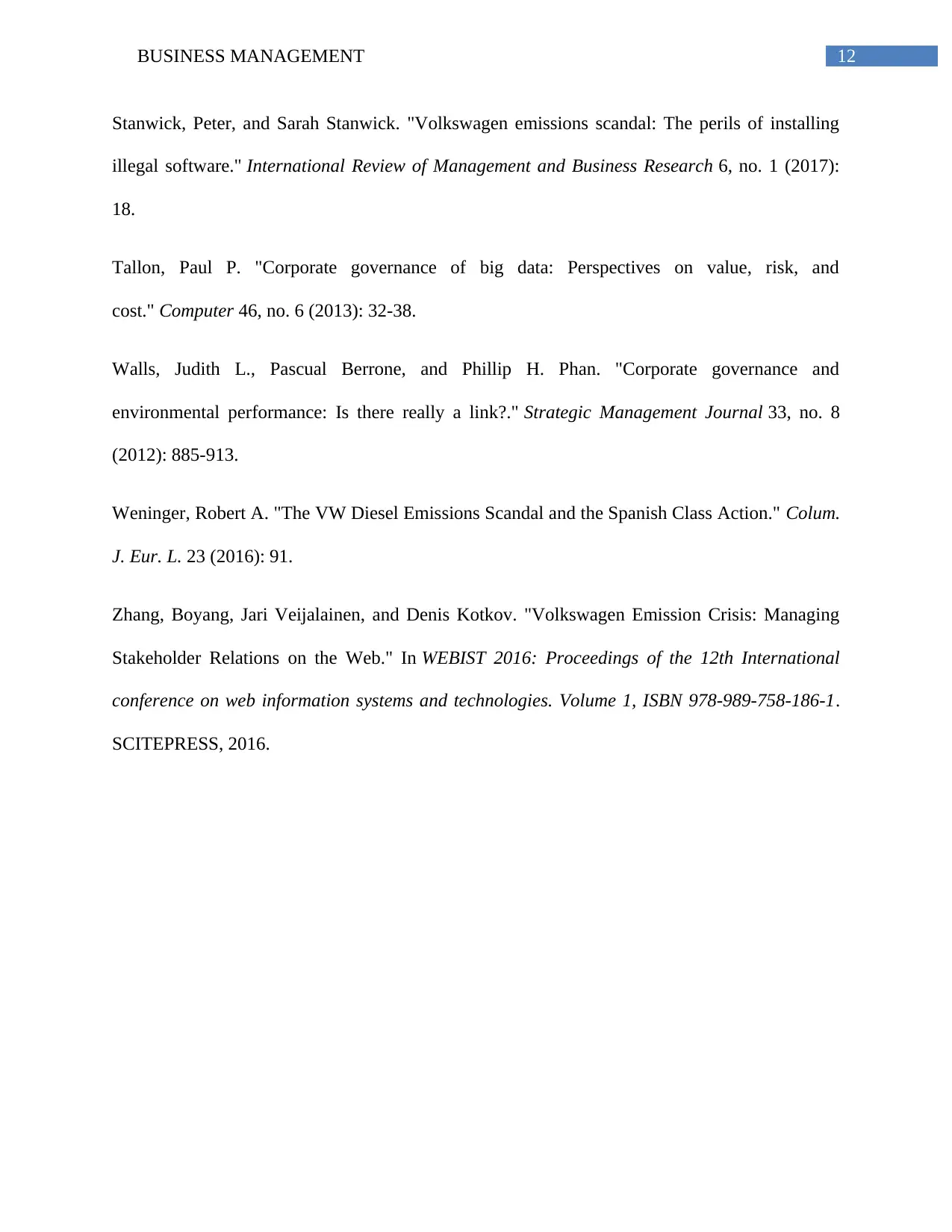
12BUSINESS MANAGEMENT
Stanwick, Peter, and Sarah Stanwick. "Volkswagen emissions scandal: The perils of installing
illegal software." International Review of Management and Business Research 6, no. 1 (2017):
18.
Tallon, Paul P. "Corporate governance of big data: Perspectives on value, risk, and
cost." Computer 46, no. 6 (2013): 32-38.
Walls, Judith L., Pascual Berrone, and Phillip H. Phan. "Corporate governance and
environmental performance: Is there really a link?." Strategic Management Journal 33, no. 8
(2012): 885-913.
Weninger, Robert A. "The VW Diesel Emissions Scandal and the Spanish Class Action." Colum.
J. Eur. L. 23 (2016): 91.
Zhang, Boyang, Jari Veijalainen, and Denis Kotkov. "Volkswagen Emission Crisis: Managing
Stakeholder Relations on the Web." In WEBIST 2016: Proceedings of the 12th International
conference on web information systems and technologies. Volume 1, ISBN 978-989-758-186-1.
SCITEPRESS, 2016.
Stanwick, Peter, and Sarah Stanwick. "Volkswagen emissions scandal: The perils of installing
illegal software." International Review of Management and Business Research 6, no. 1 (2017):
18.
Tallon, Paul P. "Corporate governance of big data: Perspectives on value, risk, and
cost." Computer 46, no. 6 (2013): 32-38.
Walls, Judith L., Pascual Berrone, and Phillip H. Phan. "Corporate governance and
environmental performance: Is there really a link?." Strategic Management Journal 33, no. 8
(2012): 885-913.
Weninger, Robert A. "The VW Diesel Emissions Scandal and the Spanish Class Action." Colum.
J. Eur. L. 23 (2016): 91.
Zhang, Boyang, Jari Veijalainen, and Denis Kotkov. "Volkswagen Emission Crisis: Managing
Stakeholder Relations on the Web." In WEBIST 2016: Proceedings of the 12th International
conference on web information systems and technologies. Volume 1, ISBN 978-989-758-186-1.
SCITEPRESS, 2016.
1 out of 13
Related Documents
Your All-in-One AI-Powered Toolkit for Academic Success.
+13062052269
info@desklib.com
Available 24*7 on WhatsApp / Email
![[object Object]](/_next/static/media/star-bottom.7253800d.svg)
Unlock your academic potential
© 2024 | Zucol Services PVT LTD | All rights reserved.




